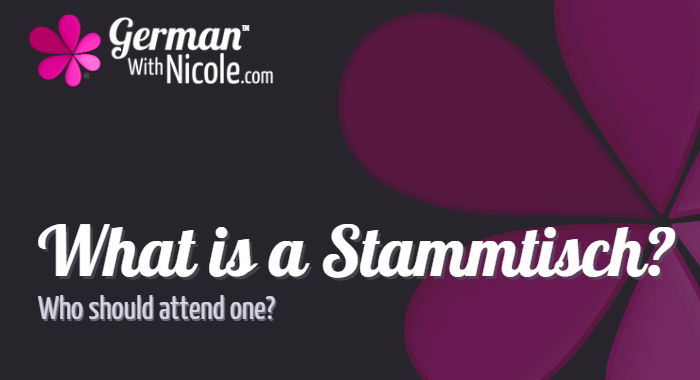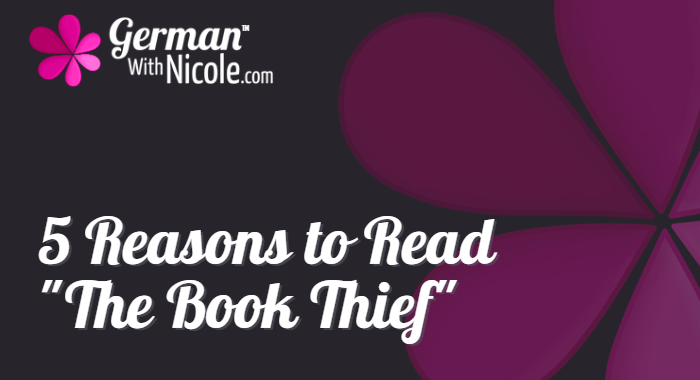Good ol'-fashioned RSS Feed
das Blog
Podcast
schief gehen
schief gehen
schief gehen
to go wrong, to go awry, to go pear-shaped
schief gehen
N.B. While the GermanWithNicole.com Podcast no longer exists, you can still hear all of the audios here on the blog. The audios are available on the blog posts published between August 1, 2021 and October 1, 2024. Viel Spaß beim Hören!
Heute ist einiges schief gegangen. Das Programm hat nicht funktioniert. Dann hat das Video nicht funktioniert. Das Mikrophon war nicht richtig angeschlossen und dann hat das P…
Zehn lustige Dinge, die meine Kunden gesagt haben
Hier sind zehn lustige Dinge, die meine Kunden gesagt haben.
Here are 10 funny things my clients have said.
- der Wasserhahn
- sein = to be. sein = his
- ADUSO
- sich verlieben in + Akk
- Drogen oder Medikamente?!
- Kichererbsen
- der Schmetterling
- etwas gebacken kriegen
- der Öko-Spießer (use with caution!)
- not Schwiegereltern, but...
N.B. While the GermanWithNicole.com Podcast no longer exists, you can still hear all of the audios here on the blog. The audios are available on the blog posts …
10 Jahre GermanWithNicole.com!
This business started out 10 years ago this month, in May of 2013. By mid-2015 this was a real part-time job, and now every week I teach two classes, over a dozen private lessons, and since I began teaching German back in 2010, I've taught a total of more than 5,550 hours of German.
Wir feiern heute! Wir feiern heute! We will celebrate today! Wir feiern heute!
In the episode/blog post you'll hear and see 10 of my favorite moments of the past 10 years – meine Lieblingsmomente der letzten 10 Jah…
B1 Review and B1 Test Prep
I am Frau Warner and I am a B1 test proctor, which means I am qualified to give this exam with the Goethe-Institut.
The B1 class I teach, which meets on Monday evenings, just had their first of two practice tests, and they all did so very well! Ich bin sehr stolz auf sie! Ich bin sehr stolz auf sie! I'm very proud of them! Ich bin sehr stolz auf sie!
N.B. While the GermanWithNicole.com Podcast no longer exists, you can still hear all of the audios here on the blog. The audios are available o…
Sagt man «Viel Glück» oder «Viel Erfolg»?
Wishing someone "good luck" in German often goes one of two ways--either "Viel Glück!" or "Viel Erfolg!" Which one you use depends on what you want to say. It's part of the entire cultural aspect of luck, and Germans have specific ways in which they try to find luck.
Today you'll learn how to give these wishes in German and what marzipan has to do with all of it.
N.B. While the GermanWithNicole.com Podcast no longer exists, you can still hear all of the audios here on the blog. The audios a…
What is a Stammtisch?
der Stammtisch
der Stammtisch – an inadequate translation is “group of regulars.”
der Stammtisch
Today you'll learn:
- what a Stammtisch is in Germany and how it differs in the US,
- what you need to know before you go,
- how often to expect to attend a Stammtisch,
- where they take place,
- and something called Einmal ist keinmal.
Sind Sie bereit? Los geht's!
N.B. While the GermanWithNicole.com Podcast no longer exists, you can still hear all of the audios here on the blog. The audios ar…
5 Reasons to Read "The Book Thief"
Of course, there are many more than 5 reasons, however here are 5 of those reasons to read The Book Thief by Markus Zusak.
I read it several years ago, and several of my clients have read it, and they keep recommending it to their spouses and friends.
I'll leave this post and the podcast episode up after the discussion (March 2023), because I sincerely hope that you will take the time to read this outstanding novel. If you care to, feel free to leave a comment below on what you think of the bo…
11 Interesting and Important Facts About Austria
This month clients in the group classes and private lessons are learning about Austria. They have access to an online lesson with typical Austrian phrases and expressions and we also had a Konversationskurs, a Conversation Class, all about Austria.
Here you get to learn some of what my clients have learned about Austria this month, including how to pronounce Österreich.
N.B. While the GermanWithNicole.com Podcast no longer exists, you can still hear all of the audios here on the blog. The au…
Which German Dictionaries are Good for Learners: Books, Websites, and Apps
Learning how to use a German-English dictionary effectively is one of the single skills which can really help support you in your German learning adventure.
German learners frequently ask: Which German-English dictionary should I buy? Is it worth buying the big one? How do I know which dictionary will be right for me? Are the online German dictionaries better?
In this blog post/podcast episode, I'll guide you step-by-step through which dictionary you can/should use as a beginner through the el…
The 3 Elements Which Make German Hard...or Easy...to Learn
There are three elements which make German hard (or easy...ok easier...) to learn:
- Materials & Resources
- Methods
- Instructor(s) or lack there of.
Today you'll learn about these three elements and how they may make German harder to learn, or maybe easier.
Together these elements create one big constellation.
Which ones help you? Which ones are simply good enough? And which elements don't help you?
Definitely cue in to the next episode next week. ;-)
N.B. While the GermanWithNicole.co…
Categories
- A1 (70)
- A2 (55)
- B1 (46)
- B2 (24)
- C1 (22)
- Deutsch lernen (81)
- Einkaufen (15)
- Essen (12)
- Grammatik (24)
- Hören (14)
- Landeskunde und Kultur (50)
- Lesen (11)
- Musik (5)
- Nachrichten (4)
- Podcast (66)
- Pronunciation (3)
- Schreiben (3)
- Schwäbisch (4)
- Spiele und Spaß (Games and Fun) (12)
- Sprechen (12)
- Vokabeln (39)
- Video (11)
Would you like to hear about future German classes with Frau Warner?
With the E-Post, you'll receive information on German class registration and goings-on in German classes, all written by Frau Warner. You'll receive an email on Tuesdays, plus an extra email or two when class registration opens or there's something new.
If you use Gmail: please check your "promotions" folder.







